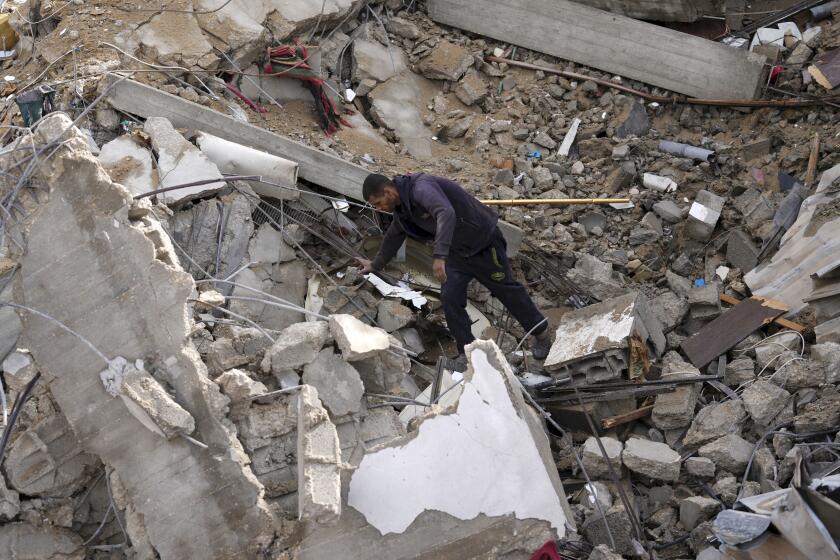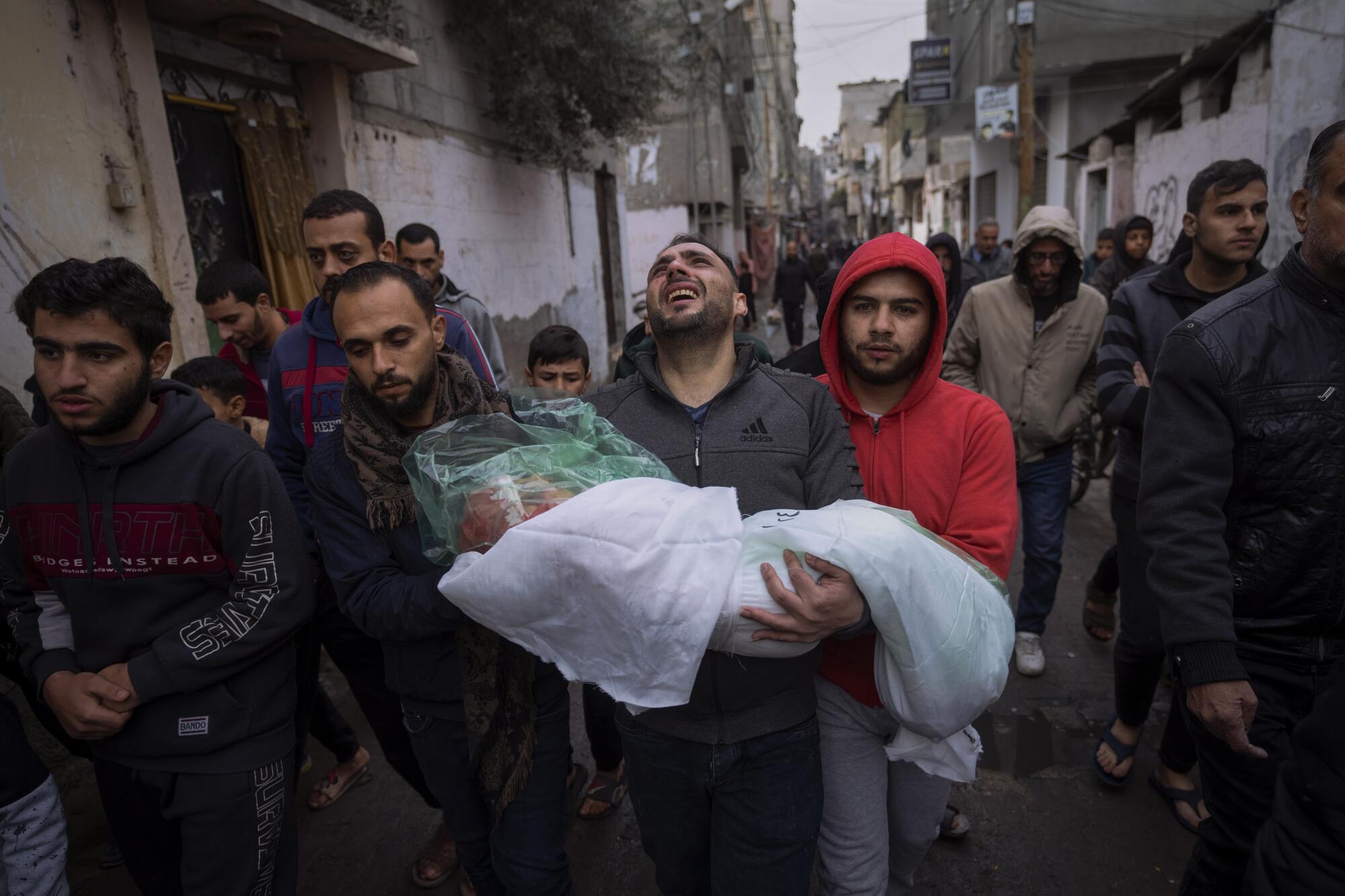
- Share via
RAFAH, Gaza Strip — A shipment of medicine for dozens of hostages held by Hamas arrived in Gaza on Wednesday, part of a deal mediated by France and Qatar that marked the first agreement between Israel and the militant group since a weeklong cease-fire in November.
The deal could bring respite to some of the roughly 100 hostages who remain in captivity, as well as to Palestinians in the Gaza Strip in desperate need of additional aid. But fighting still rages in many parts of the beleaguered enclave, and an end to the war — or the release of the hostages — seems nowhere in sight.
Qatar’s Foreign Ministry spokesman, Majed Ansari, announced late Wednesday on X, formerly Twitter, that the shipment had crossed into Gaza, without saying when or how the medicine would be distributed.
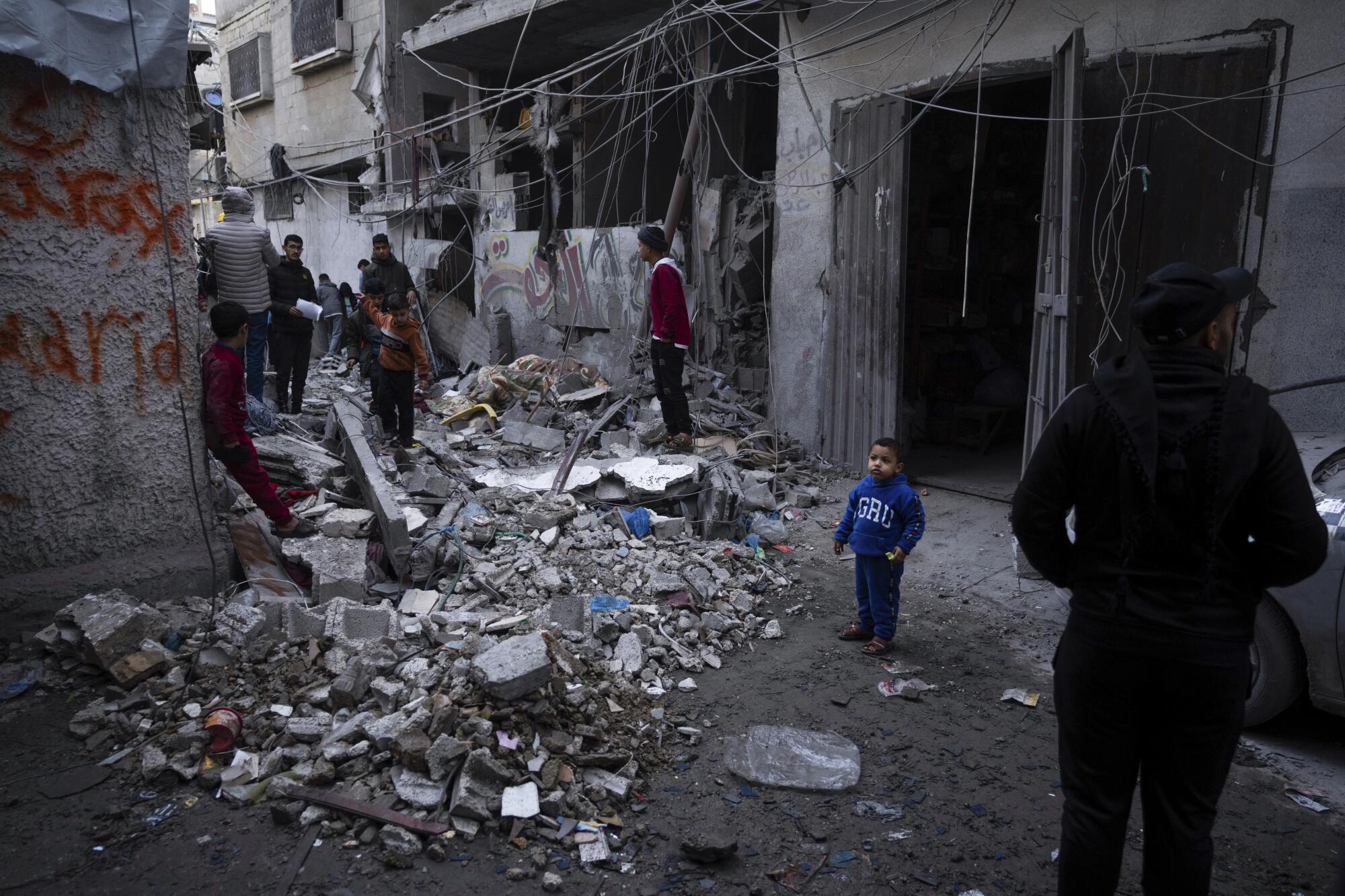
“Over the past few hours, medicine & aid entered the Gaza Strip, in implementation of the agreement announced yesterday for the benefit of civilians in the Strip, including hostages,” he wrote.
A senior Hamas official said that for every box provided for the hostages, 1,000 boxes of medicine would be sent in for Palestinians. The deal also includes the delivery of humanitarian aid to residents of the besieged coastal enclave.
The agreement came 100 days into the conflict and as Palestinian militants across Gaza continue to battle Israeli forces in one of the deadliest military campaigns in recent history. More than 24,000 Palestinians have been killed, according to the Hamas-run Health Ministry. Some 85% of the narrow coastal territory’s 2.3 million people have fled their homes, and the United Nations says a quarter of the population is starving.
The deadly strike comes on the 100th day of the Israel-Hamas war that has devastated Gaza, raising new concerns of a second front.
Israel has vowed to dismantle Hamas to ensure it can never repeat an attack like the one on Oct. 7 that triggered the war. Militants burst through Israel’s border defenses and stormed through several communities that day, killing some 1,200 people, mostly civilians, and capturing around 240.
Israel also has promised to win the return of more than 100 hostages still held inside Gaza.
Hamas has said it will not release any more hostages until there is a permanent cease-fire, something Israel and the United States, its top ally, have ruled out.
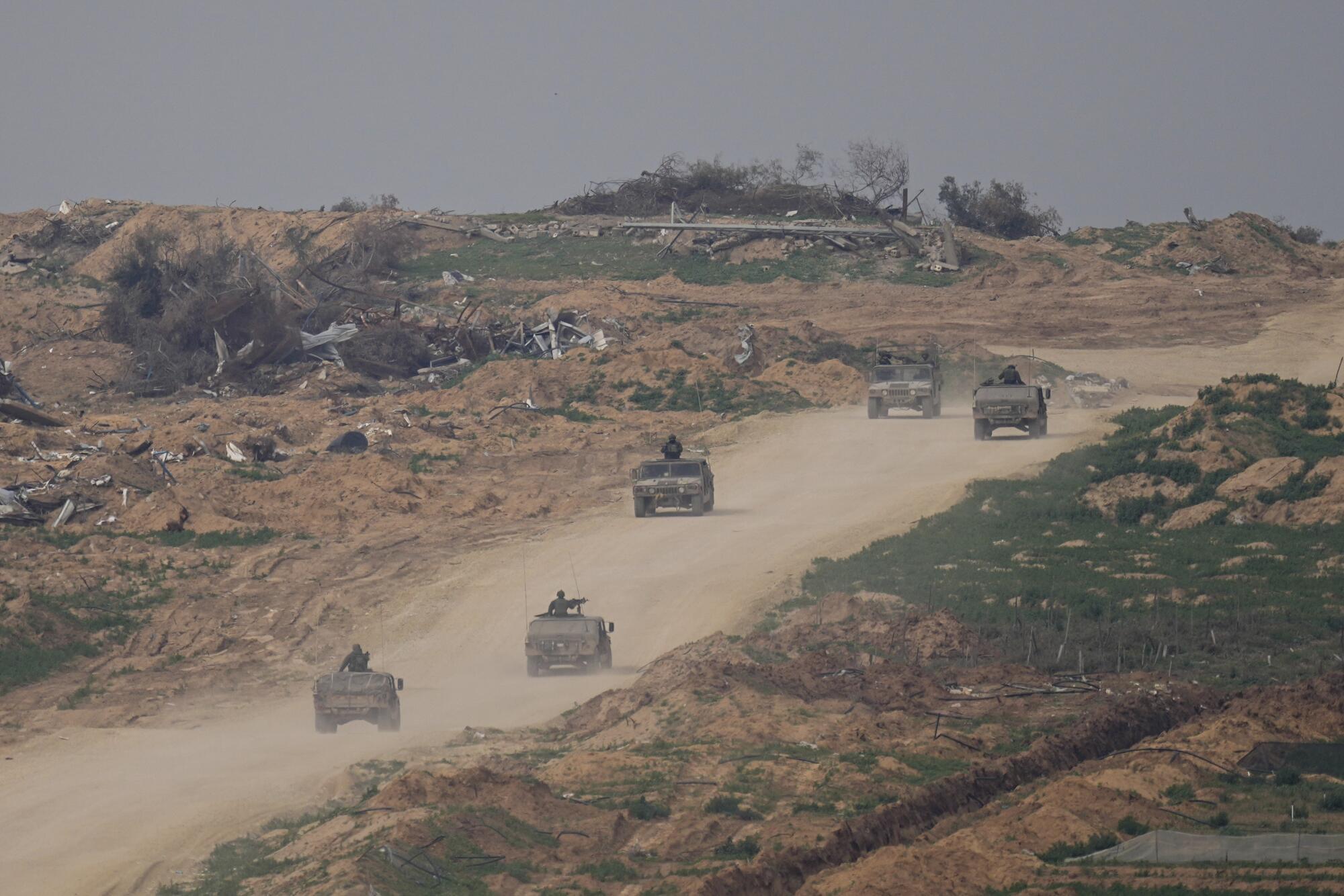
The last deal in late November between Israel and Hamas brought a temporary truce in exchange for the release of more than 100 hostages, mostly women and children, as well as freedom for dozens of Palestinians imprisoned by Israel.
A Qatari official said the medicine would be delivered to the hostages by the Health Ministry in the Hamas-run territory. It was not immediately clear when the drugs would be delivered or how the handover would be verified. The official spoke on condition of anonymity because he was discussing behind-the-scenes diplomatic efforts.
France said it took months to organize the shipment of the medicines. Qatar, which has long served as a mediator with Hamas, helped broker the deal that will provide three months’ worth of medication for chronic illnesses for 45 of the hostages, as well as other medicine and vitamins. Several older men are among the remaining hostages held in Gaza.
South Africa’s lawyers have told judges at the United Nations’ top court that Israel is intent on committing genocide in Gaza, in a landmark case.
Moussa abu Marzouk, a senior Hamas official, said in a post on X that the International Committee of the Red Cross will deliver all the medicines, including the ones destined for the hostages, to hospitals serving all parts of Gaza. The ICRC declined to comment.
Senior U.N. officials have warned that Gaza faces widespread famine and disease if more aid is not allowed in.
Israel completely sealed off Gaza after Hamas’ Oct. 7 attack and only relented under U.S. pressure. It says there are now no limits on the entry of humanitarian aid and that U.N. agencies could reduce the delays by providing more workers and trucks.
But U.N. officials say aid delivery is hobbled by the opening of too few border crossings, a slow vetting process and continuing fighting throughout the territory — all of which is largely under Israel’s control.
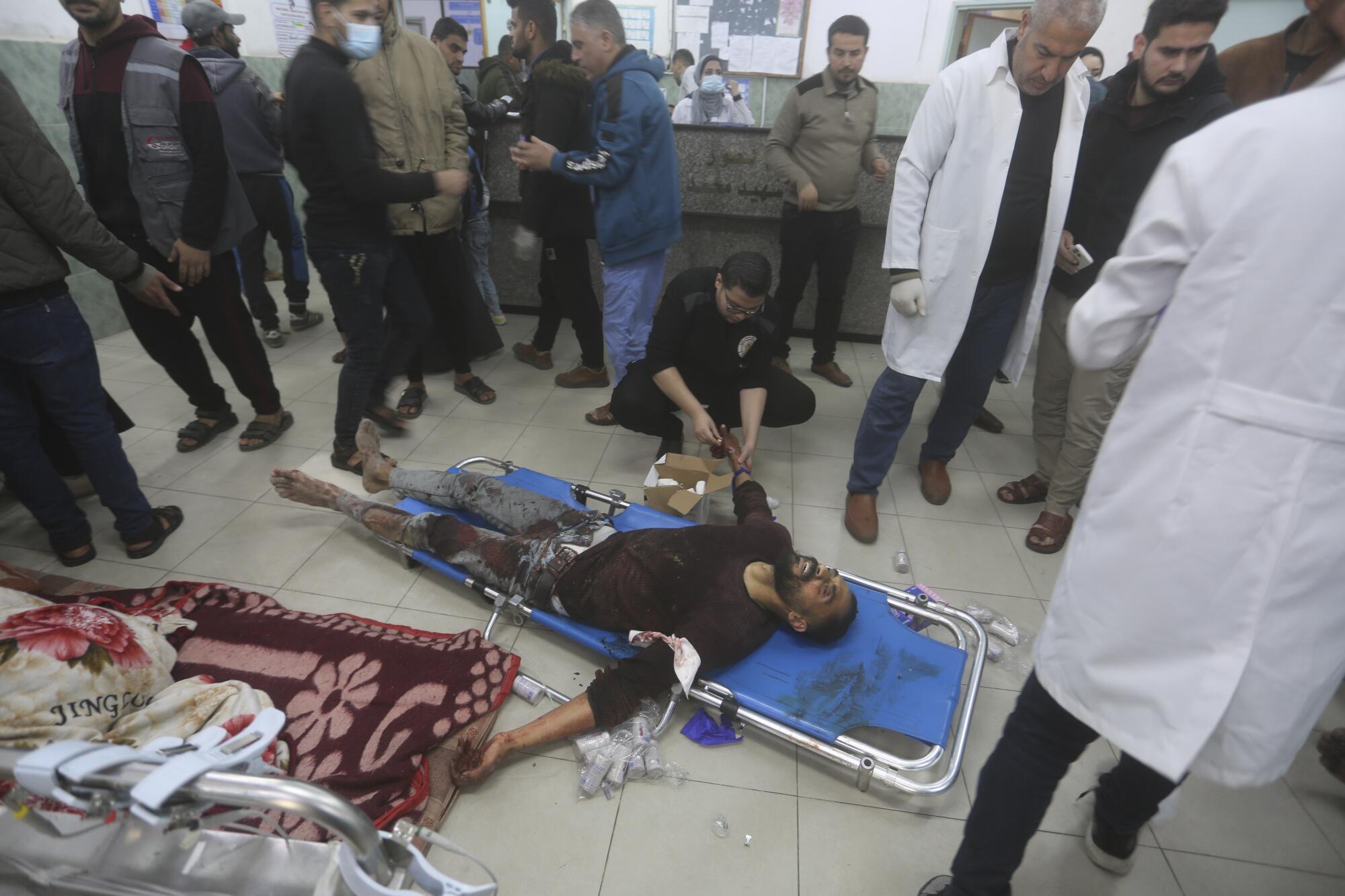
Israel said at the start of the year that it had largely defeated Hamas in northern Gaza and would scale back operations there, focusing on dense urban areas in the center and south. Additional Israeli forces withdrew from Gaza on Monday, but there has been little apparent letup in strikes, with scores of Palestinians killed every day.
A strike on a home killed a woman and two children in the southernmost town of Rafah. An Associated Press reporter saw the bodies arrive at a nearby hospital. Tens of thousands of people who heeded Israeli evacuation orders have sought shelter in the town, which is home to the border crossing with Egypt.
Gaza’s Health Ministry said Wednesday that 163 bodies were brought to the territory’s remaining functioning hospitals in the previous 24 hours, as well as 350 wounded people. The update brought the war’s overall death toll in Gaza to 24,448, with over 60,000 wounded, the ministry said. It said many other dead and wounded are trapped under rubble or unreachable because of the fighting.
The ministry does not differentiate between civilian and combatant deaths but says around two-thirds of those killed were women and children.
The word has become shorthand for systems of oppressive rule around the world — and a popular refrain of pro-Palestinian activists.
Israel blames the high civilian death toll on Hamas because it fights in dense residential areas. Israel says its forces have killed roughly 9,000 militants, without providing evidence, and that 192 of its own soldiers have been killed since the Gaza ground offensive began.
Militants are still fighting in all parts of the territory, and Israel appears no closer to freeing the remaining hostages. The deaths of two more hostages were confirmed Tuesday after Hamas said they were killed in Israeli airstrikes.
Tensions are also soaring in the occupied West Bank, where Israeli forces have conducted near-daily arrest raids that often trigger shootouts with Palestinian militants.
Israeli forces killed at least 10 Palestinians on Wednesday in the territory, including five in the urban Balata refugee camp in the north, the military said. Among that group was a senior militant whom the military said was responsible for militant infrastructure and was allegedly involved in recent attacks against Israelis.
Start your day right
Sign up for Essential California for the L.A. Times biggest news, features and recommendations in your inbox six days a week.
You may occasionally receive promotional content from the Los Angeles Times.
Five Palestinians were also killed in an Israeli strike in Tulkarm, the Palestinian Authority Health Ministry said. The military said it targeted a group of militants who had opened fire and were throwing explosives at Israeli soldiers.
More than 360 Palestinians have been killed in the West Bank since Oct. 7.
The Middle East has seen a barrage of strikes and counterstrikes in recent days from northern Iraq to the Red Sea and from southern Lebanon to Pakistan.
In the last few days, a U.S.-led coalition has carried out strikes against Iran-backed Houthi rebels in Yemen. Iran has struck what it described as an Israeli spy headquarters in northern Iraq and anti-Iran militants in Pakistan and Syria. Israel and Lebanon’s Hezbollah have escalated their fighting across the border, raising fears of another war.
Jeffery reported from Cairo and Goldenberg from Tel Aviv. Associated Press writer Isabel DeBre in Jerusalem contributed to this report.
More to Read
Sign up for Essential California
The most important California stories and recommendations in your inbox every morning.
You may occasionally receive promotional content from the Los Angeles Times.
